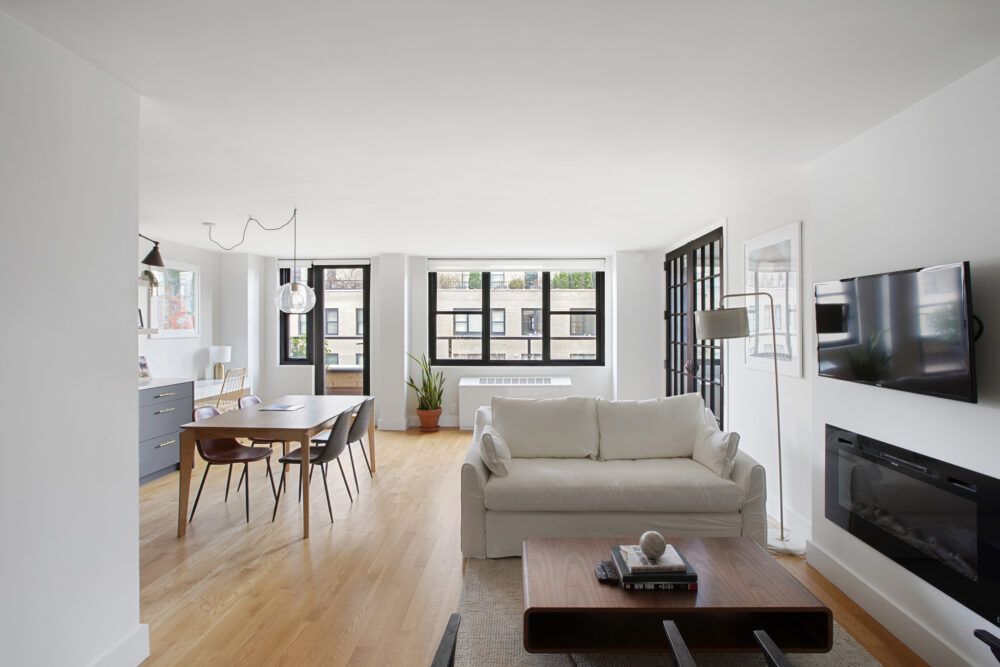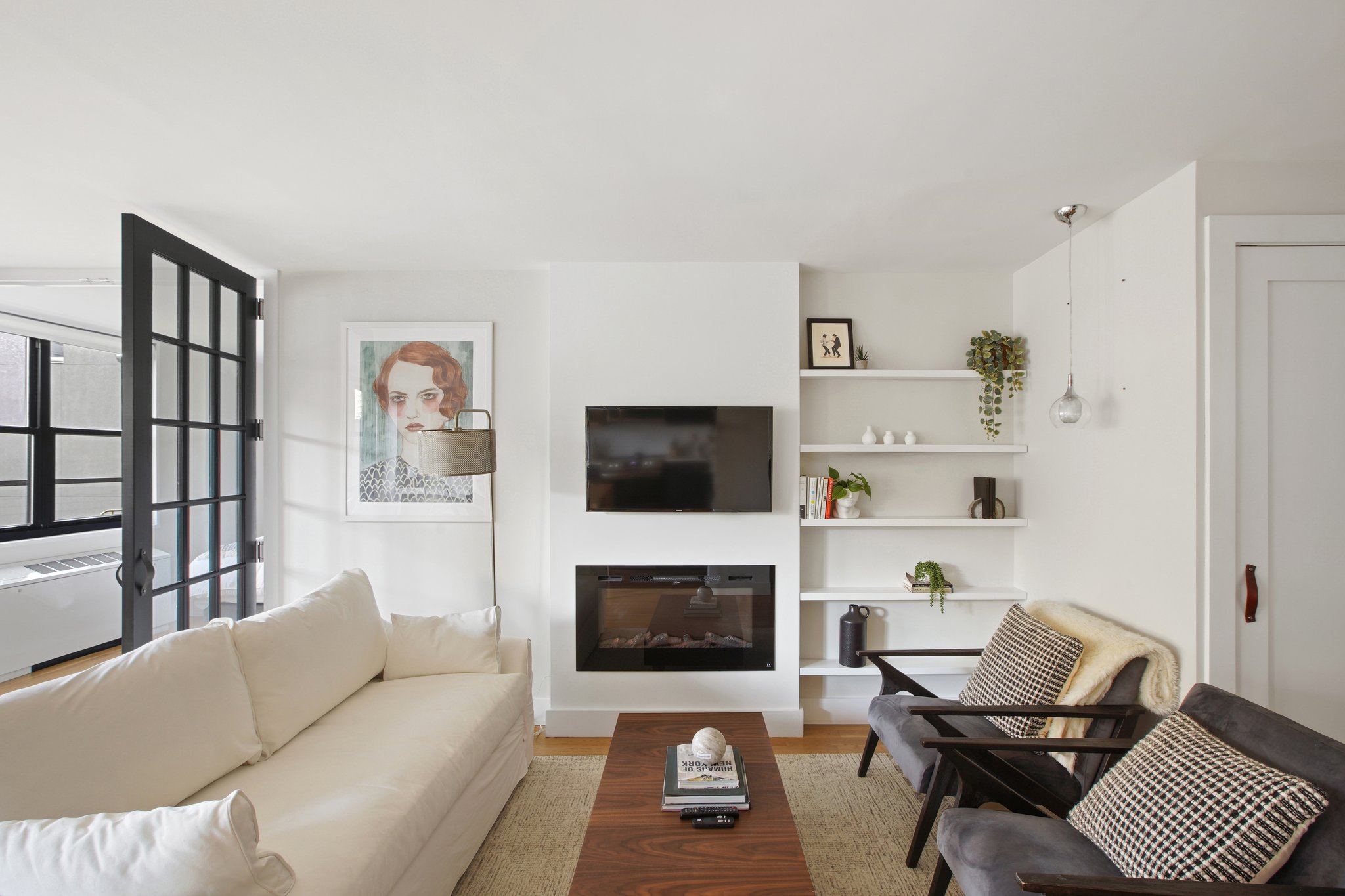
What are the pros and cons of staying in a short-term rental in NYC?
As originally seen in Brick Underground on 2/21/2023
If you are contemplating staying in a furnished short-term rental in New York City, you likely have lots of questions and concerns. How do you go about finding one? What do they cost? Are they even legal? And what about the furniture—will it be dated or banged up?
Here’s the answer: There’s a range of options available, despite the city’s crackdown on Airbnbs and other vacation properties, so landing a furnished, short-term rental is entirely possible as long as you play by the rules—namely, a minimum stay of 30 days.
Pro #1: Temporary housing only when you need it
Rather than having to commit to a 12-month lease, a short-term rental lets you stay for a minimum of 30 days or a finite term like three or six months.
So if you aren’t putting down roots in the city yet, this solution offers flexibility, and some agencies even let you extend the lease after your initial 30-day period ends.
Pro #2: Cost-savings over staying in a hotel
As with regular rentals, short-term rates vary depending on whether you are renting a room or a three-bedroom apartment and also the location and building type—like a five-story walk-up or full-service high-rise.
For those on a budget, a short-term rental will cost less than your average $285-a-night hotel room for a 30-day stay (which would be $8,550).
Pro #3: Bundled pricing for predictable monthly expenses
Knowing what your out-of-pocket costs will be from the get-go has its obvious advantages.
Some short-term rental agencies (including Nice Stay) have all-inclusive rates that bake all those costs—wifi, utilities, twice-monthly housekeeping, and maintenance—into the base rent.
Pro #4: Easy turn-key living
Furnished short-term rentals are move-in ready—just bring your personal belongings and settle right in. Not having to buy (or rent) furniture is a huge bonus. Same for not having to deal with setting up utilities and wifi.
That idea is appealing to people across the board, but agent Rana sees it as especially helpful when dealing with the stress and strain of a renovation. “Being able to live in a furnished short-term rental while renovating is something I have seen amongst my network (myself included),” she says. “These turn-key operations, which offer you the comforts of home, seem much more desirable than the idea of signing a 12-month lease, contacting movers, and moving or buying furniture. Since Covid, people are willing to pay slightly more for convenience and ease.”
Rachel Lustbader, a broker at Coldwell Banker Warburg, can vouch for this idea. Her family rented a two-bedroom unit at the Bristol at 210 East 65th St. while they were renovating their apartment. “The unit was clean and well-kept, and the lease included twice-weekly housecleaning service. Although we were living in much closer quarters than usual, we found the space to be very cozy.” (For more intel, read Brick’s guide to finding a short-term rental during a renovation.)
That same one-stop shopping is also good for professionals with short-term projects that bring them in and out of town, says Ellen Sykes, a broker at Coldwell Banker Warburg. “In general, however, short-term rental apartments are pretty basic and not abounding in charm. The quality of fixtures and even the furniture is not high-end or even close to it.”

Pro #5: Design-friendly accommodations
That said, if you go with a short-term agency, you can get seriously stylish digs.
The apartments managed by Nice Stay rock a modern aesthetic (like the one shown above, complete with gas fireplace and terrace).
Pro #6: Potential high-end amenities
Of course, your average studio sublet might not even come with a doorman or elevator, much less a package room for your online deliveries. But if those features are important to you, then you can focus your search accordingly.
And you can expect the usual perks of high-end lodging—complimentary wifi, valet laundry service, housekeeping, grocery delivery plus a fitness center, cinema, café, lounge, and business center.
Pro #7: No credit check required (maybe)
If you haven’t established a credit history or yours is a bit tarnished, know that some short-term agencies (including Apt212 and Nice Stay) and most extended-stay residences (such as Sonder) do not run credit checks. But a criminal background check is usually required.
Pro #8: The chance to check out a building or neighborhood
“One of the major benefits of a short-term rental is the housing equivalent of taking a new car for a test drive. The only real way of experiencing the vibe of a building or neighborhood is by actually living in it for a few months without a long-term commitment,” says Josh Tepper, an agent at Coldwell Banker Warburg. “I had a customer who signed a two-year lease only to find out that every weekend loud motorcyclists would congregate at a bar down the street until 3 am. A short-term rental would have prevented this unfortunate situation.”
Pro #9: Buys time before signing a 12-month lease
With NYC rents at all-time highs, you might be understandably hesitant to lock into a peak rate. Finding a one-, three-, or even six-month rental lets you hedge your bets until rents settle down again. What goes up must come down, right?
That flexibility can be a real strategy for renters, says Tracie Hamersley, a broker at Douglas Elliman. You might be able to extend the lease month-to-month, depending on the situation, which can be helpful if your plans are up in the air—or your dates are flexible and you can find more inventory during the summer months. “It definitely can help avoid signing a lease in the peak rental season of April/May to September, as you can almost always get the best deals for an annual lease in the months of November through February,” she says.
But rents are higher during peak months when listings are plentiful. Derek Milhem, an agent at Coldwell Banker Warburg, says, “Historically, rents and demand are higher in the spring and summer. Consequently, if the tenant is planning on looking for permanent housing at the end of the temporary lease term, the season in which the lease terminates should be taken into consideration.”
Pro #10: Provides a buffer before buying
Similarly, if you are waiting for more inventory to come on the market or mortgage rates to come down before buying a property—a short-term rental may make sense for you.
Or if your current lease is up or you are moving here for the first time, John Walkup, co-founder of UrbanDigs, a real estate data analytics firm, says, “Short-term rentals can be a good, albeit expensive, option for future buyers to bide their time and explore before bidding. However, for the extra cost, short-term renters get not just increased flexibility but often a turn-key residential solution.”